In the city of brotherly love, sports and passion go hand in hand. Having worked a short time there back in 2006, I learned how much sports talk radio means to people and how important of a role it can play in the lives of the listening audience.
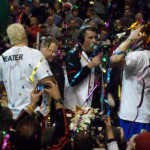 While the Eagles, Flyers, Sixers, Phillies and Big 5 colleges certainly matter to local people, what stood out even more during my short stay in Philly was how invested the audience was in the on-air personalities and local sports talk radio stations. Hosts were seen as larger than life celebrity figures and when public events were held such as WIP’s Wing Bowl, the response was as strong as any I’ve seen in local markets.
While the Eagles, Flyers, Sixers, Phillies and Big 5 colleges certainly matter to local people, what stood out even more during my short stay in Philly was how invested the audience was in the on-air personalities and local sports talk radio stations. Hosts were seen as larger than life celebrity figures and when public events were held such as WIP’s Wing Bowl, the response was as strong as any I’ve seen in local markets.
As the years have gone by, the interest in Philadelphia sports radio has only increased and it remains to this day one of the top performing markets in the entire country. One of those reasons is due to great programming from two top-notch stations, WIP and 97.5 The Fanatic. I am a firm believer that competition makes everyone better and there’s no doubt that both stations have had a tremendous impact on raising the bar in the Philadelphia market.
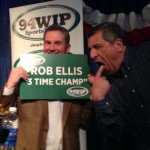 This week I have the opportunity to chat with someone who’s experienced both sides of the Philadelphia sports radio battle, WIP afternoon drive-time host Rob Ellis who works weekdays from 1p-6p opposite Anthony Gargano. Rob has been with WIP since May, 2007 and prior to his move to afternoons, he hosted nights and weekends. Rob is from Upper Darby, PA and a proud alum of Temple University and holds the distinction of being a four-time winner of WIP’s Great Birds Debate.
This week I have the opportunity to chat with someone who’s experienced both sides of the Philadelphia sports radio battle, WIP afternoon drive-time host Rob Ellis who works weekdays from 1p-6p opposite Anthony Gargano. Rob has been with WIP since May, 2007 and prior to his move to afternoons, he hosted nights and weekends. Rob is from Upper Darby, PA and a proud alum of Temple University and holds the distinction of being a four-time winner of WIP’s Great Birds Debate.
What makes this week’s chat a little different is that I’m chatting with someone who started his radio career under my watch. It was March 2006 when I received a call from Rob who at the time was working as a television producer for CSN Philadelphia and upon our chat I could tell quickly that he was smart, passionate, knowledgeable and hungry. I was in the market looking for talent to help the radio station and while his radio experience was non-existent, something about him stood out.
I took a chance and threw him into a 3-man show one night and as luck would have it, he came to the table with strong opinions, great information and an ability to click and form great chemistry with his partners. When you listen to Rob today, you’ll see those same ingredients still on display!
 Since then Rob’s star has only grown brighter and much of that in my opinion is due to his commitment to continue working at his craft while taking advantage of every opportunity that’s come his way. I think it’s also important to point out the great job that’s been done by WIP Operations Manager Andy Bloom in helping Rob’s development. Every great talent needs a good leader who believes in them and by moving Rob to prime time opposite Anthony Gargano, Andy showed his confidence in Rob’s ability to make a difference.
Since then Rob’s star has only grown brighter and much of that in my opinion is due to his commitment to continue working at his craft while taking advantage of every opportunity that’s come his way. I think it’s also important to point out the great job that’s been done by WIP Operations Manager Andy Bloom in helping Rob’s development. Every great talent needs a good leader who believes in them and by moving Rob to prime time opposite Anthony Gargano, Andy showed his confidence in Rob’s ability to make a difference.
I exchanged some notes back and forth with Rob on the challenge of doing a 5-hour show, working solo vs. on a team show and what he believes matters each day to his audience and below are the results of our conversation.
Q: Who did you listen to growing up that influenced you to want to pursue a career in this business?
A: I listened to a lot of national and local radio. Nationally I was influenced by Dan Patrick, Bob Costas, John Barr. Locally, Howard Eskin, Jody McDonald, Angelo Cataldi.
Q: What’s your prep process for each day’s show (what do you read, watch, listen to, who do you meet with, when do you get in, etc)?
A: I typically spend 2-3 hours minimum before each show. I read espn.com, philly.com, csnphilly.com, profootballtalk.com, deadpsin, aol.com, tmz.com to name a few. I watch ESPN’s SportsCenter, as well as local CSN, and Fox Sports1. I also will touch base with my contacts/sources with the teams depending on what is happening. And I speak to and or e-mail with my co-host and producer.
Q: You’ve worked solo shows, two-man shows and even three-man shows – what are the biggest challenges and benefits of each?
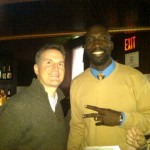 A: The biggest challenge of a solo show is you better be prepared. It is all on you, you cannot take a segment off. You could have a game plan that you think will work for a show and it goes no where, so you better have a “Plan B”. Conversely, you may stumble upon something that touches a nerve, if so, roll with it.
A: The biggest challenge of a solo show is you better be prepared. It is all on you, you cannot take a segment off. You could have a game plan that you think will work for a show and it goes no where, so you better have a “Plan B”. Conversely, you may stumble upon something that touches a nerve, if so, roll with it.
The challenge of a two-man is, if you are not driving to a certain extent you are at the mercy of your partner, which can limit what you want to do or how you’d steer the show. It can also be tricky if you agree too much. That can be boring. You need a balance. You cannot be afraid to voice your opinion to your partner if you want to take things in another direction. Happy medium’s can be a challenge at times.
Three-man shows are tricky because you need to maximize your voice without stifling your co-horts. You must try not to talk over one another which is not an easy task if your are aggressive.
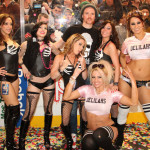 Q: WIP is known for venturing into lifestyle/entertainment subjects in addition to every day sports topics – why do you believe this concept works in your market?
Q: WIP is known for venturing into lifestyle/entertainment subjects in addition to every day sports topics – why do you believe this concept works in your market?
A: I think mixing things up with lifestyle/entertainment is good because it simply breaks things up. Going at the same one or two subjects when doing a local show can become tedious which leads to changing the dial. If you can mix in something about your wife or kids that connects with your audience is a great tool to have. It’s relatable. It can’t be your driving force but it’s a nice change-up.
Q: You’ve climbed the ladder & landed in PM drive opposite Anthony Gargano. In making that jump to prime time, what have been the biggest challenges you’ve faced?
A: My biggest challenge in moving into afternoon drive from being behind the scenes in TV was making myself and my name a brand and a house-hold recognizable commodity. Establishing what my personality is and who I am. I made it a point when we had station debate with other on-air talent such as Angelo Cataldi and Howard Eskin, to go after them and not be afraid to mix it up. Respect but not reverential. I also had to prove myself in the toughest of time slots. 5 hour solo’s during Christmas, late night, delivering when given the shot in day parts from morning to afternoons.
Q: You’re on the air every day for 5 hours – what do you do to stay mentally focused and engaged in every segment?
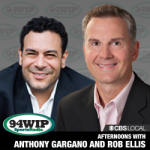 A: The biggest key for me is pacing, if the show stays fresh for me by moving it along, it will stay fresh for the audience. I need variety, Topic branches, guests and different takes keep me engaged. Don’t get me wrong, 5 hours is a grind. But if you keep it moving it keeps you as the host mentally in it.
A: The biggest key for me is pacing, if the show stays fresh for me by moving it along, it will stay fresh for the audience. I need variety, Topic branches, guests and different takes keep me engaged. Don’t get me wrong, 5 hours is a grind. But if you keep it moving it keeps you as the host mentally in it.
Q: Looking at the layout of a 5-hour program, how many guests do you like to have on during the course of a full show? What’s the reasoning behind your strategy?
A: This one really depends on the day. With 5 hours, I typically like to have at least 2 guests usually spread about two hours apart. But there are days when that varies due to guest availability and breaking news. It really is a feel thing. But with five hours I like to break up host banter and calls with some guests.
Q: How often do you recycle topics during the course of your show? How do you keep those stories/angles fresh?
A: I’m a fan of re-visiting subject matter if it warrants. If we do an interview in our first hour or two (non-drive time) I think it is vital to re-play it in say the five o’clock hour. That is one way. There are also plenty of twists you can put on a story. “How does the LeBron signing impact the 76ers”? As opposed to just five hours of LeBron talk tie it in locally. Pose a question you threw out there in hour two for folks who didn’t hear it or have a chance to react to it via a phone call.
 Q: When it comes to interaction with your audience, why do you believe callers are so critical to the presentation in your market?
Q: When it comes to interaction with your audience, why do you believe callers are so critical to the presentation in your market?
A: Calls are a great way to foster and further conversation but they cannot be a crutch. Anyone can be a call jockey. I want calls who give a new take or disagree or agree in an intelligent way. Calls aren’t a right they are a privilege. I do think they are necessary because folks want to have a voice and they want to feel like they are a part of what we are doing. Overall I think interaction is great.
Q: How important do you believe it is for an on-air personality to be accessible and engaged with the audience regularly on social media?
A: It is very important to be accessible but you have to be careful with social media. Always remember you represent your employer. Engaging in a pissing match with a knucklehead on Twitter or Facebook is a losing battle. And your paid to give your opinion on the radio so don’t give a ton out for free. But I think it is very important from a promotional standpoint to use those tools to your advantage.
The Anthony & Rob show featuring Anthony Gargano and Rob Ellis airs weekdays from 1p-6p on SportsRadio 94WIP. To stream the show or catch up on previous audio clips from the show click here.

Jason Barrett is the Founder and CEO of Barrett Media. The company launched in September 2015 and has provided consulting services to America’s top audio and video brands, while simultaneously covering the media industry at BarrettMedia.com, becoming a daily destination for media professionals. Prior to Barrett Media, Jason built and programmed 95.7 The Game in San Francisco, and 101 ESPN in St. Louis. He was also the first sports programmer for SportsTalk 950 in Philadelphia, which later became 97.5 The Fanatic. Barrett also led 590 The Fan KFNS in St. Louis, and ESPN 1340/1390 in Poughkeepsie, NY, and worked on-air and behind the scenes at 101.5 WPDH, WTBQ 1110AM, and WPYX 106.5. He also spent two years at ESPN Radio in Bristol, CT producing ‘The Dan Patrick Show’ and ‘GameNight’. JB can be reached on Twitter @SportsRadioPD or by email at Jason@BarrettMedia.com.



